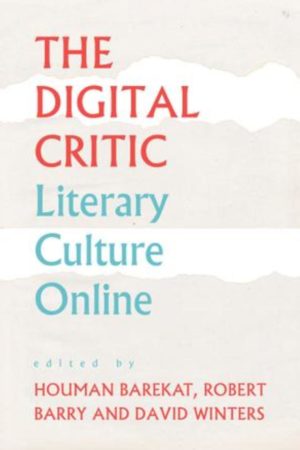You have no items in your cart. Want to get some nice things?
Go shopping There’s a certain aptness in reviewing a book entitled The Digital Critic for an online publication: although Litro isn’t explicitly cited in the book, this is exactly the sort of Internet community that many of its contributors explore. The book is a collection of essays—more or less; some are adapted versions of talks given elsewhere, like a Will Self lecture delivered at Brunel University—on the topic of the subtitle: literary culture online. Given that the Internet is the most wide-reaching communication technology ever developed, such consideration of its effect on the way we produce words now, and what we choose to produce them about, and why, is long overdue.
There’s a certain aptness in reviewing a book entitled The Digital Critic for an online publication: although Litro isn’t explicitly cited in the book, this is exactly the sort of Internet community that many of its contributors explore. The book is a collection of essays—more or less; some are adapted versions of talks given elsewhere, like a Will Self lecture delivered at Brunel University—on the topic of the subtitle: literary culture online. Given that the Internet is the most wide-reaching communication technology ever developed, such consideration of its effect on the way we produce words now, and what we choose to produce them about, and why, is long overdue.
The editors—Houman Barekat, Robert Barry, and David Winters, all of whom are connected to Review 31 and/or 3:AM Magazine, two of the most significant players in the online literary journal scene—have chosen essays representing a wide array of subtopics. As a result, the collection feels like a sort of primer for people interested in this sort of thing: by reading it, you can get a sense of the major issues surrounding online literary debates, a feel for the landscape of the literary Internet as it currently is. Of course, since the book had to be commissioned, written, published, marketed, and produced as a physical object, it is not nearly as up-to-the-minute as it would be if it had appeared as a series of online columns. Louis Bury’s essay “Topical Criticism and the Cultural Logic of the Quick Take” (they’ve all got mouthful titles like that) makes virtually this same point. Dissecting the timeline of responses to Kenneth Goldsmith’s offensive performance poem, “The Body of Michael Brown”, he notes that the online quick take (a thread of tweets, a blogger’s essay, a reheated HuffPo editorial) and rigorous scholarship are innately opposed, and that scholarship might not always be the most relevant approach:
Writing [the full story] would require thorough research, deep background knowledge…[and] careful and nuanced argumentation… Indeed, by the time this hypothetical book was finished being researched, written, and published, the amount of careful attention it paid to recent Conceptualist controversies might well feel disproportionate to their import.
He argues that although the quick take can feel like a throwaway genre, at its best it provides a place to discuss issues that are worthy of attention, but maybe not that much attention.
Other essays examine topics that range from literary translators’ use of the Internet (in an excellent essay by Ellen Jones that foregrounds the online journal Asymptote and discusses how its editorial team works to place translation further to the front of readers’ brains), to working “for exposure” in the age of moribund print media (covered by Jonathan Sturgeon and Sara Veale), to a writer’s need for isolation and how that works when social media demands constant accessibility (the subject of Will Self’s abovementioned talk). Mostly these take a positive view, although several writers point out the limitations of the Internet in effecting change; Scott Esposito notes that although bookish communities can use the Internet to communicate more effectively amongst themselves, it has proven much harder to use it as a tool for evangelisation. In other words, you can’t use the Internet to convert non-readers into readers, or people who don’t care about books into people who do care about books. Social media networks promote the ghettoisation of ideas and interests, not their diffusion.
My favourite, from a standpoint of usefulness to me as a professional bookseller, is an essay on publishers. Michael Bhaskar makes a compelling argument for seeing publishers as the very first “critics” of a text, in the sense that the choices they make about a book—editorial but also, very significantly, in terms of marketing and cover design—create a foundational interpretation of that book that every other reader and critic builds on. His examples are clearly chosen to delight as well as to instruct: he writes about Lee Child, who is positioned by his publishers as a man who writes books that you buy in airports. Everything from the font of the title to the choice of blurbs to the price point is designed to support this basic interpretation. Yet Bhaskar also cites Andy Martin, a Cambridge critic who spent a year watching Child write a novel. After the project ended, Martin wrote a tongue-in-cheek mock Cambridge exam paper: “ENGLISH TRIPOS Part II; Paper 12 Lee Child Studies.” Bhaskar writes:
It’s a[n] exercise in re-assessing Lee Child…as a writer in a grand tradition, a fruitful discussion piece…alongside a George Eliot or even a James Joyce. This is an amusing, different kind of approach to criticism—perhaps weird, but not wholly implausible.
I’d add that it’s an approach that lends itself to the increasing visibility and legitimacy of readers and critics of genre fiction in particular. At least half of the bloggers and critics whose work I find most groundbreaking, edifying, and/or enjoyable are committed in one way or another to assessing genre works, and the reason these writers have the profiles that they do is in large part due to the levelling influence of the Internet.
Relatedly, and of particular interest to bloggers, are the several essays in the collection interested in the collapsing distinctions between “professional” or “elite” critics, and the criticism of the general public on forums like Goodreads, Amazon, and, of course, sites like this one. Jonathan Sturgeon and Sara Veale talk about literary hack work in a time when major publications are collapsing their book, film, music and dance coverage into all-purpose “arts” sections, and when some of the most interesting and exciting critical projects are being launched by small publications that can’t afford to pay their contributors. Veale argues for exposure as a good; she acknowledges that it’s often a fig leaf for exploitation by large companies, like the aforementioned Huffington Post, but also confesses that she has managed to find paying freelance work and even a few regular gigs by engaging in unpaid work and the networking opportunities that it opened up. Lauren Elkin introduces the concept of open access, which I’d have liked to see more of in this collection; the debate that rages around issues of copyright, academic writing, literary production, and accessibility is of utmost importance, and it’s a shame that only Elkin’s essay addresses that.
It would also have been nice to see at least one of the contributors explicitly acknowledge that the ability to participate in “professional” literary culture is in large part reliant on your ability to pay your rent whether there’s money coming in regularly or not, and that, therefore, the rise of “amateur” online literary critics might be a) representative of the fact that this is an increasingly difficult proposition, and b) a potentially fertile source of brilliant criticism that comes from people who happen not to be able to afford to play the game.
Still, this is a collection of essays that I would like every bookseller, book blogger, book reviewer, arts page editor, and minister for the arts to read. The Internet has revolutionised how we think, read, and write; for good or for ill, it’s a phenomenon to which readers and critics should be paying close attention. With consistently solid writing and argumentation, and a rich diversity of opinion and focus, The Digital Critic is illuminating at every turn.
The Digital Critic is published by OR Books.

About Eleanor Franzen
Eleanor Franzén is a London-based writer and editorial assistant. She blogs about books at Elle Thinks (https://www.ellethinks.wordpress.com).




